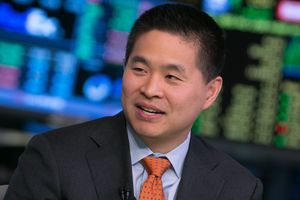Corrections and clarifications: An earlier version of this story misstated Brad Katsuyama's age.
NEW YORK -- Wall Street's enemies tend to be limited to lawmakers who have threatened to crack down on them such as Massachusetts Senator Elizabeth Warren and presidential candidate Bernie Sanders, both of whom have called for breaking up the banks.
![The Great Debate [image : 80630344]](http://www.gannett-cdn.com/media/2016/02/19/USATODAY/USATODAY/635914990525112407-Katsuyama-Obrien1.jpg)
Then there's Brad Katsuyama, the baby-faced founder of a financial startup who has vowed to fundamentally change the way stocks are bought and sold — all for the benefit of the little guy.
![Brad Katsuyama of IEX [pullquote : 80878166]](https://presto-usatoday.gannettdigital.com/Portals/_default/Skins/PrestoLegacy/CommonCss/images/pullquote.jpg) Katsuyama, 37, is the CEO of Investors' Exchange, or IEX. He starred in Michael Lewis' 2014 bestselling book, "Flash Boys," about the advantages the current market system can give to computer-powered traders.
Katsuyama, 37, is the CEO of Investors' Exchange, or IEX. He starred in Michael Lewis' 2014 bestselling book, "Flash Boys," about the advantages the current market system can give to computer-powered traders.
After the book came out, high-speed trading was blamed for growing market turbulence, among other woes.
Critics, in turn, accused Katsuyama of painting the industry in an unfair light to win customers. He got into a heated debate on CNBC that so transfixed Wall Street, trading volumes dropped 8%, according to the cable news network. The Internet trolling got so bad the father of three deleted his Twitter app from his phone and considered hiring security, he told USA TODAY in an interview.
The speed bump
Fast forward to today and the battle is heating up again as Katsuyama seeks permission to upgrade IEX from a private trading platform, or "dark pool," to a registered exchange.
Approval would let IEX play in the same league as the New York Stock Exchange, Bats, and the Nasdaq Stock Market. As a registered exchange, IEX may also compete for stock listings, or the practice of wooing companies to list their stock with the exchange.
IEX's Securities and Exchange Commission application, however, has met with an astounding level of opposition, including dozens of letters of opposition from large and powerful Wall Street institutions.
By contrast, the SEC received just one letter for Bats Global Markets' first stock exchange application, which simply read: "Amen, brothers and sisters. It's about time."
![NYSE [image : 80630384]](http://www.gannett-cdn.com/media/2016/02/19/USATODAY/USATODAY/635914991764540352-AP-Financial-Markets-Wall-Street.jpg)
The main difference between IEX and other stock exchanges is a 350-microsecond delay, which Katsuyama says is "one one-thousandth the speed of you blinking your eye."
The goal of the delay, which Katsuyama calls a speed bump, is to prevent high-speed traders from cutting the line to pick off the best prices, leaving slower traders with the crumbs, he says. By slowing the process down a fraction of a second, high-speed traders lose their advantage, Katsuyama says.
Opponents argue that IEX's speed bump will muck up market mechanics because, once the exchange is regulated, brokerages will be required to route their trades there if it is showing the best price, even if that price is distorted by the delay.
![Jamil Nazarali, head of Citadel's execution services unit [pullquote : 79830360]](/Portals/_default/Skins/PrestoLegacy/CommonCss/images/pullquote.jpg) "Every time they are showing the best price, by law I have to send my order there whether the price is stale or not," says Jamil Nazarali with trading behemoth Citadel. "It’s not a speed bump, it’s a pothole," says Nazarali, whose firm was featured in "Flash Boys."
"Every time they are showing the best price, by law I have to send my order there whether the price is stale or not," says Jamil Nazarali with trading behemoth Citadel. "It’s not a speed bump, it’s a pothole," says Nazarali, whose firm was featured in "Flash Boys."
Industry pushback
IEX opponents, upon learning that USA TODAY was working on an article, reached out without solicitation to advocate against the exchange, including one man who emailed to say: "IEX is trying to create a narrative of David vs Goliath so as to avoid the substantive issues with their application."
Bats complained to the SEC that IEX was making "gross misrepresentations" about other exchanges in order to win approval. And NYSE compared IEX to the duplicitous frozen yogurt shop made famous by television sitcom "Seinfeld."
IEX is "like the 'non-fat yogurt' shop on Seinfeld, which actually serves tastier, full-fat yogurt to increase its sales," NYSE said in its letter to the SEC.
Katsuyama said he feels "vindicated" by how the battles lines have been drawn. "Those we were looking to protect are supportive of us and those who we were protecting them from are against us."
Indeed, IEX has drawn praise from some of the very buy-and-hold investors it has vowed to protect, such as T. Rowe Price and Southeastern Asset Management. "We receive larger and higher quality executions (with IEX) compared to most other venues," Britt Harris, chief investment officer with Teacher Retirement System of Texas, said.
The SEC will respond to Katsuyama's application by March 21st. The regulator has been pressured to push its decision further down the road to assess complaints that the speed bump violates rules requiring exchanges to display stock prices "immediately and automatically."
If rejected, Katsuyama plans to try again, he said. "We're not going to give up."
Follow USA TODAY reporter Kaja Whitehouse on Twitter: @kajawhitehouse
![Gannett-cdn [oembed : 80871802] [oembed : 80871802] [oembed : 80871802] [oembed : 80871802] [oembed : 80871802] [oembed : 80871802] [oembed : 80871802] [oembed : 80871802] [oembed : 80871802] [oembed : 80871802] [oembed : 80871802] [oembed : 80871802] [oembed : 80871802] [oembed : 80871802] [oembed : 80871802] [oembed : 80871802]](/Portals/_default/Skins/PrestoLegacy/CommonCss/images/smartembed.png)



